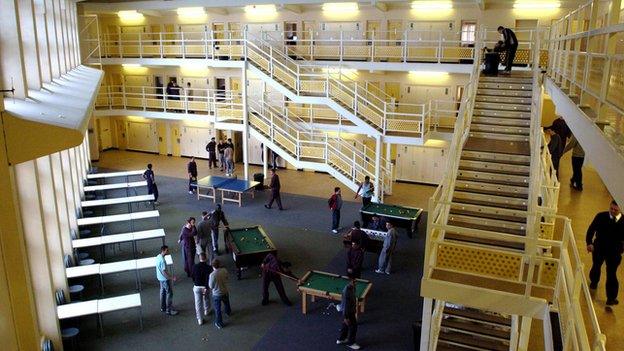HMP Woodhill: What can be done to cut prison suicides?
- Published
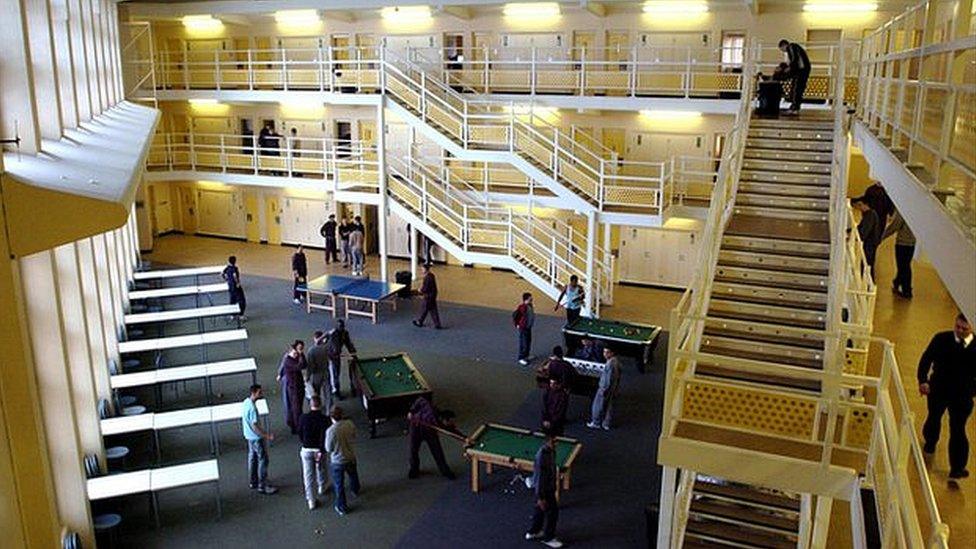
In the past five years 20 inmates at HMP Woodhill have killed themselves - more than another other prison in England and Wales
Last year seven inmates killed themselves at HMP Woodhill, more than in any other prison. A coroner has now called for the government to act, following an inquest into one of the deaths. But how unusual are suicides in prisons and what can be done to prevent them?

The numbers
It is not the first time spikes in suicides have been seen in prisons.
Seven suicides were reported at HMP Wandsworth, in Milton Keynes, in 2000, six in Durham in 2003, Manchester in 2004, Leeds in 2006 and Birmingham in 2010.
What makes HMP Woodhill different is that the number of self-inflicted deaths has been consistently high.
Twenty inmates have killed themselves at the 819-capacity Category A prison in the past five years - the next highest suicide numbers were recorded at HMP Liverpool (1,300 capacity) with 14, and Leeds (1,212 capacity) with 13.

Tom Morris
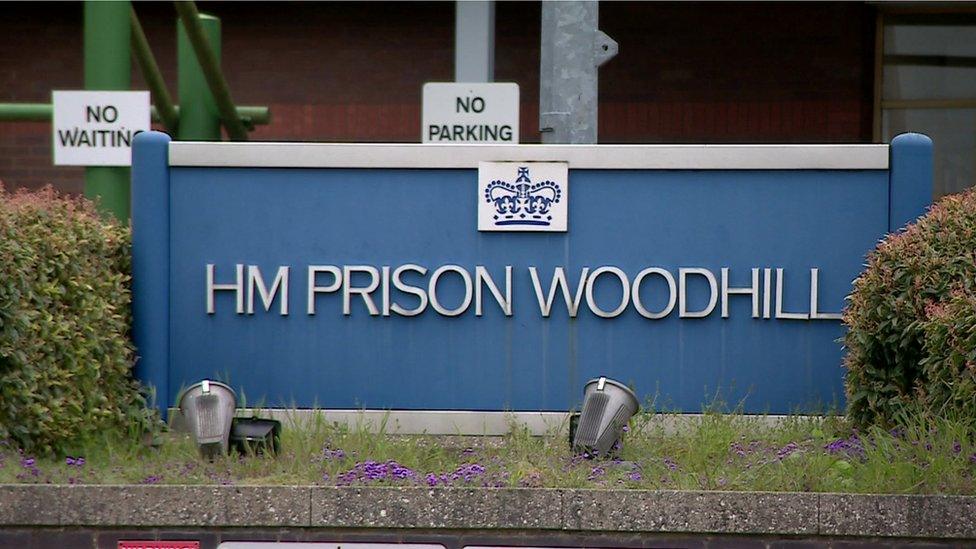
Ralph Morris, Tom's father, wrote to the prison in April 2016, warning his son was suffering from paranoid schizophrenia
One of those Woodhill inmates was Tom Morris. The 31-year-old, who was serving a short sentence for shoplifting, died in June 2016.
Fellow inmates told the inquest into his death he was moved after throwing his television across his cell.
He ended up in a single cell.
The decision to move him proved fatal, according to his fellow inmates.
"He shouldn't have been moved off the wing," said Peter Hance, who was on the same unit.
"If he had been kept on the wing where people knew him, he'd have had someone to talk to."
His father Ralph Morris told the BBC how he wrote to the prison in April 2016 warning his son was suffering from paranoid schizophrenia.
After Mr Morris died, dozens of inmates sent his father a letter which they also copied to the prison authorities.
The prisoners stated that everyone knew that Mr Morris was ill: "And by everyone, we mean inmates and staff and health professionals".
Senior coroner Thomas Osborne, who oversaw Mr Morris' inquest, said government intervention was required. He called for mistakes to be learned from and for systems to be changed if, and when, they fail.
But do the issues go deeper than that?

'Systematic failings'
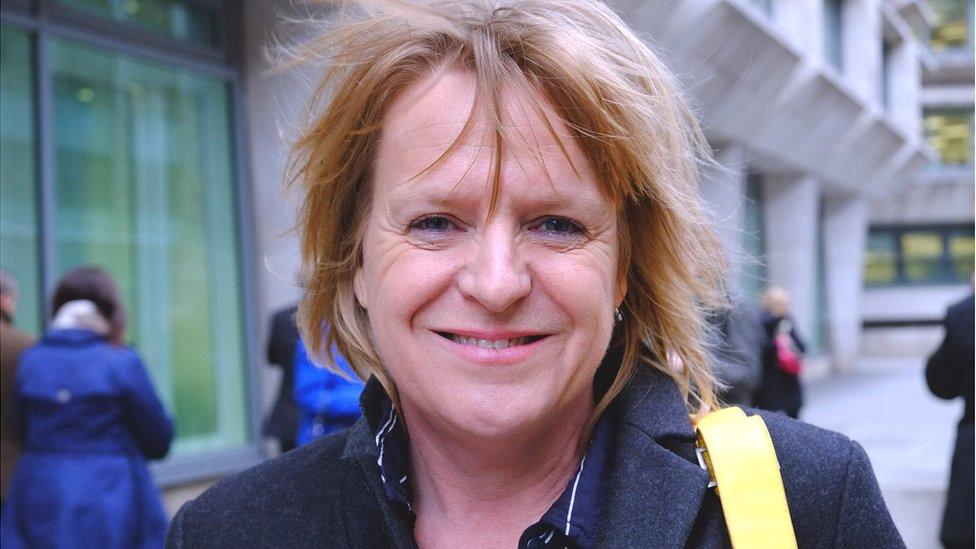
Deborah Coles said deaths can only be prevented with "concrete, lasting change" within the prison system
The circumstances of Mr Morris's death - as with all suicides in prisons - were unique and particular to him.
But there are common themes in such deaths, say groups involved in the justice system.
"Too many of these deaths are preventable and highlight systemic failings in care," said Deborah Coles, director of the support charity Inquest.
She believes deaths such as that of Mr Morris can only be prevented with "concrete, lasting change" within the prison system.
"However, concrete, lasting change can only happen if there is a dramatic reduction in the prison population, an end to the criminalisation of people with mental health problems, and diversion from prison and investment in alternatives.
"These problems are system-wide and the lack of learning and action continues to contribute to preventable deaths."

Suicides in England and Wales

Suicide rate in prisons (per 1,000): 1.41
General population (per 1,000): 0.11

Prison numbers
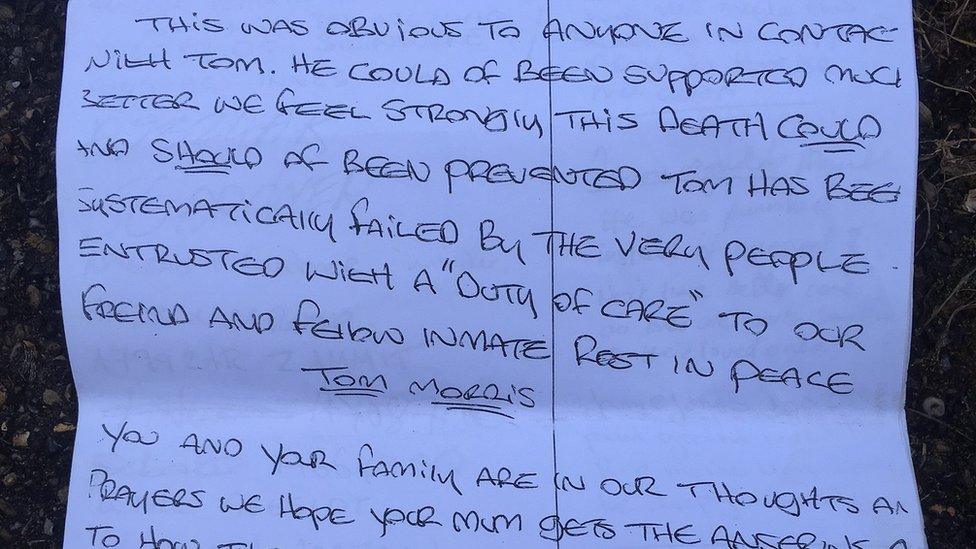
Tom Morris was "systematically failed", fellow prisoners claimed in a letter to his father
There are currently 85,863 people in English and Welsh prisons, external. According to the Prison Service's own data, 69% of prisons were classed as "overcrowded", external.
"Until we get the sheer numbers down we will continue to have deaths, self-injury and violence," says Frances Crook, chief executive of the Howard League for Penal Reform.
She believes that procedures such as highlighting those deemed at risk of self-harm are important, but argues that relieving "overcrowding" is even more so.
Glyn Travis, deputy general secretary of the Prison Officers Association, says it is not just the numbers of inmates coming into the system but how often those prisoners have mental health issues.
"The current system is not fit for purpose," he said. "There are far too many prisoners coming in with mental health issues and we have not got the staff to care for them.
"The solution is about training, about awareness, it is about systems and it is about staff."

'Boots on the ground'
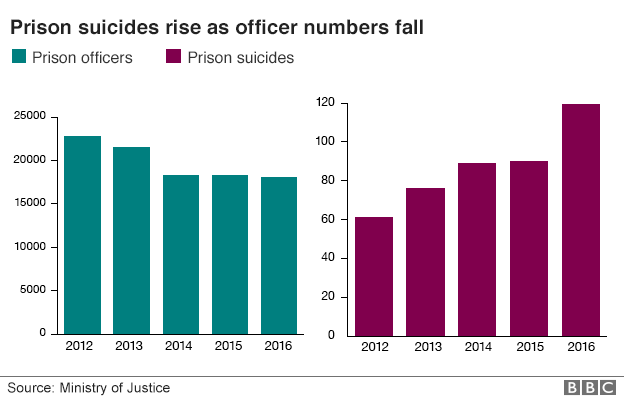
"It's about boots on the ground," says Prof Pamela Taylor, chair of the Royal College of Psychiatrists' Forensic Faculty.
"The level of suicides is now the highest since 1978 and only then because that was the year we started recording the numbers.
"Since 2011 the number of prison officers have been slashed. No, you cannot prove one causes the other but it seems highly likely that they are related because of course with fewer staff you can do less things.
"There are some very simple problems arising, like there not being enough staff to take inmates to mental health clinics, either within prisons or outside.
"Clinics are reporting lots of cancellations. In severe cases with somebody in great distress, when a clinician will go to a patient's cell, you need several prison officers to open the door. For safety reasons, that's absolutely right - but when there are not enough staff it is a real nightmare."
Time outside in fresh air, or simply to exercise or associate with other people are vitally important to sustaining mental health, argues Prof Taylor.
"But even these basics are in short supply," she said.
"And with so few prison officers you cannot do things like drug screenings, and people with mental health problems are particularly vulnerable both to taking drugs and being pressured by others to bring drugs in."

Former Woodhill inmate Jamie Blyde (left) told the BBC's Michael Buchanan it was not just the number of officers at a prison that mattered
Former inmate Jamie Blyde knew seven of the prisoners who took their lives at HMP Woodhill.
Speaking previously to the BBC he said the quality of prison officers was also very important.
"We're getting the wrong sort of staff," he said. "We used to get all the ex-forces, guys that could be annoying and hard to be around, but you knew where you stood with them.
"They were safe and would do everything by the book.
"We don't seem to have as many of them any more, we're getting a lot of under-qualified people, a lot of people that are not meant for the job."
Giving evidence to Mr Morris's inquest, the current acting governor Nicola Marfleet highlighted issues with prison staffing.
"I'm working with 50% of officers who are on probation or just off probation. Every time I check the database more staff have left, new staff have arrived. It's incredibly difficult.
"We're still in deficit in (terms of) numbers and I'm seeing a regular trickle of resignations, which means we are routinely short of officers.
"We use detached duty staff from other prisoners for three months at a time."
Data from the past 15 years shows how rises in prison deaths are nearly always followed by a sharp reduction.
"In any prison you can argue that when there has been a serious incident they do look at it and ask what can be done to improve the situation," says Prof Taylor.
Such seems to be the case at Woodhill, where no suicides have been reported so far this year.
"No-one has been able to identify the root cause of our clusters of deaths but something has changed," said Ms Marfleet.
"I hope and pray that this turns into a year with no self-inflicted deaths, and then two years."

Most at risk
Newcomers are the most at risk of suicide in prisons, says Prof Taylor.
It means staff shortages are felt most acutely in local prisons, such as HMP Woodhill, which have higher proportions of inmates on pre-trial remand.
"You will have relatively more people becoming very distressed when they are experiencing prison for the very first time," she said.
Inmates serving longer sentences not only develop into the routine of prison life, she said, but tended to be more able to take advantage of the various opportunities offered through the prison system, such as treatment programmes or educational courses.
A spokeswoman for the Ministry of Justice said: "The safety of those in our custody is a priority and all prisons have procedures in place to support those at risk of committing self-harm or suicide.
"We have increased the support available to vulnerable offenders - especially during the first 24 hours in custody - and have invested more in mental health training for prison officers.
"We are working closely with NHS England and Public Health England to improve mental health services for offenders at all points of the criminal justice system and to address these issues in our establishments."
- Published23 May 2017

- Published22 May 2017

- Published7 April 2017
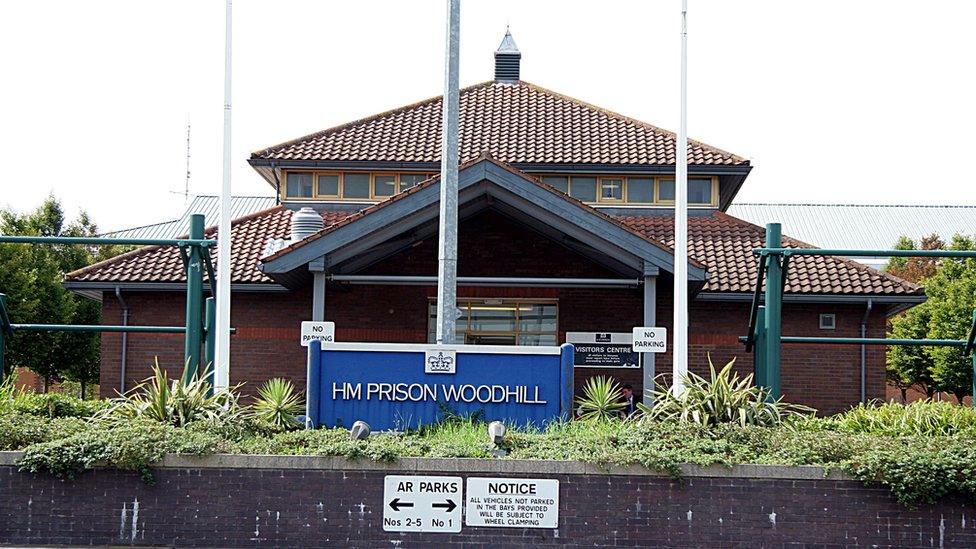
- Published17 December 2014
